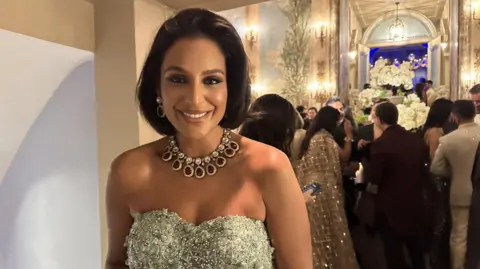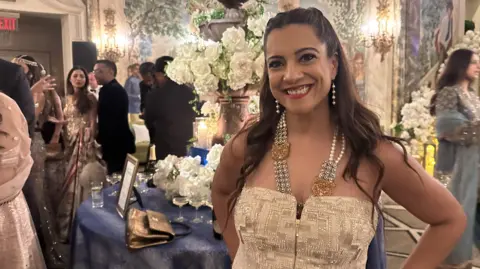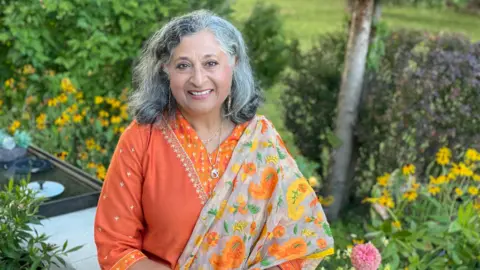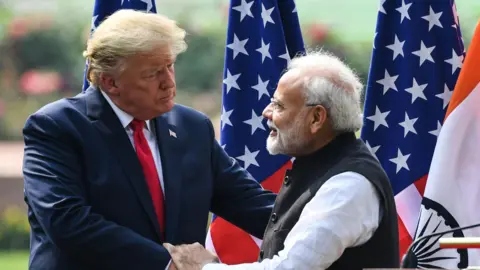 BBC
BBCOn a recent October evening on New York City’s Upper East Side, hundreds of influential Indian Americans ranging from Bollywood actors to tech CEOs, dressed in bedazzled outfits and heavy jewellery, mingled over cocktails to celebrate the Hindu festival of lights at the posh hotel The Pierre.
But while the invitation called for a Diwali celebration, the party was buzzing with excitement over the Indian American community’s latest political milestone: Kamala Harris becoming the first US presidential candidate of South Asian heritage to lead a major party ticket.
“This time around is so unique because we actually have someone we can relate to that hopefully has our best interests at heart,” Jessel Taank, the first Indian cast member in Bravo’s reality show, The Real Housewives of New York City, told the BBC at the All That Glitters Diwali Ball.
“You cannot be what you cannot see,” added Reshma Saujani, CEO of Girls Who Code and the first Indian American woman to run for US Congress in 2010, pointing out that so many South Asian girls see themselves in Harris.
The challenge for Harris is to channel that enthusiasm among a booming immigrant population that’s moved beyond the traditional South Asian strongholds of California and New York to battleground states like Georgia, Michigan and Pennsylvania.
Both Harris and her Republican challenger Donald Trump have stepped up efforts to court Indian Americans, the largest and most politically active group among Asian American voters, in a tight election where any demographic advantage could tip the outcome in their favour.
Harris became the first person of Indian descent, as well as the first woman and black person elected as vice-president in 2020. But the 2024 election – and her surprise candidacy – culminates in the transition of the Indian American community into a political force over the last decade.
Along with Harris, this presidential cycle has featured the rise of other Indian Americans including Usha Vance, the wife of Donald Trump’s running mate JD Vance. During the Republican primary, voters came to know Vivek Ramaswamy and Nikki Haley, who both challenged Trump for the nomination.

Alongside the prominence of national Indian American figures, the community’s political engagement has deepened, too. Indian Americans saw the highest voter turnout among Asian Americans in the last two presidential elections, compared with white voters, according to research firm AAPI Data, an organisation that collects data about Asian American communities. In 2020, 71% of Indian Americans that were eligible to vote did, a 9% increase from 2016.
That trend looks set to continue in November, according to Karthick Ramakrishnan, co-founder of AAPI Data, who said he believes Harris’s candidacy could boost South Asian voter turnout to 75% among eligible voters.
“While having the first ever person of South Asian origin as vice-president of the United States was important to many South Asian voters, it’s a much bigger deal to have someone from one’s background in the highest office in the land,” he said.
Over half of Indian American voters identify as Democrat (55%) compared with 26% who identify as Republican, according to a 2024 AAPI Data voter survey. While still a majority, the number of Indian Americans leaning Democrat has been declining since 2020.
A survey released Sunday by the Carnegie Endowment for International Peace and YouGov found that 61% of registered Indian American voters planned to vote for Harris while 32% intended to cast a ballot for Trump. Though the community continues to favour the Democratic party, the latest poll showed a “modest drift” toward Trump and Republicans, which researchers say is driven by Indian American men, particularly younger men born in the US.
The same survey found more than 60% of Indian American women intended to vote for Harris compared with about 50% of Indian American men who said they planned to vote for Trump.
For Anju Sawni, a doctor based in Flint, Michigan, Harris’s gender and commitment to reproductive rights is pushing her to vote more than the vice-president’s heritage.
“I am so worried for my patients. We’ve already gone backwards in our health care in this country, particularly for choices, by taking away women’s rights when it comes to terminating pregnancies,” Ms Sawni said.
 Anju Sawni / BBC
Anju Sawni / BBCKirtan Patel, a Democrat and attorney in Atlanta, Georgia, said Harris had added “fuel to the fire” but the Indian American community in the pivotal swing state is a growing force. He said he knows several Indian Americans who typically vote Republican instead planning to cast their ballot for Democrats over their dislike of Trump.
“Character matters. I feel like deep down character is where the turning is happening,” he said.
Yet even within the Indian American community – which spans different religions, language, caste and economic backgrounds – there are questions over Harris’s racial identity and how rooted her connection to India is, with both Indian and Jamaican-born parents.
Trump, who travelled to India as president in 2020, struck a close relationship with Prime Minister Narendra Modi, a dynamic that resonated with Modi’s Hindu nationalist supporters. Some worry Harris won’t prioritise a strong US-India relationship.
“Some people talked about the relationships between India and the US, and that Trump really made a lot of effort with the relationship,” said Priti Pandya-Patel, a New Jersey-based healthcare professional and chairwoman of the South Asian Coalition, a group designed for Republicans to connect with the South Asian community. “Kamala Harris – I don’t even think that she’s ever even visited India in her years as vice-president.”
President Joe Biden has tried to maintain close relations with India as part of his administration’s effort to counter China, hosting the prime minister for a rare State Dinner in June 2023. Harris, too, hosted a luncheon for Modi with Secretary of State Antony Blinken during the visit. She has tried to court Indian American voters by holding cultural events, meeting with Indian-American business executives and phone-banking and canvassing Indian Americans using their native languages. Harris has also opened her official residence to scores of Indian Americans at an annual Diwali party.
 Getty Images
Getty ImagesThe Trump campaign has tried to reach Indian American voters through door-to-door campaigning and earned media in Indian outlets, according to Shalabh Shalli Kumar, chairman of the Hindu Coalition of the Republican National Committee.
Republicans have also sought to appeal to the South Asian community in recent years by leaning into concerns about crime, education and the economy, issues that weigh heavily among some Asian Americans.
Ms Pandya-Patel said illegal immigration is one of her top concerns, and said she believes the vice-president should have found a way to address the issue over the last four years. Trump and his allies have repeatedly hammered Harris and the Biden administration on the issue of immigration.
“I came here in the 1970s. My dad came legally and worked really hard to get to where he is. I just feel that all these people who came legally in the 60s and 70s and worked their way up, are being punished or not rewarded,” she said.
But the South Asian vote is not a given for either candidate. Mr Kumar, of the Hindu Coalition of the Republican National Committee, said the Trump campaign has not capitalised enough on the Indian vote in battleground states as it did four years ago. He said Democrats have done a better job of reaching the community this cycle.
Mr Ramakrishnan contends that Harris’s favourability among South Asians, and Indian Americans in particular, especially among their burgeoning populations in critical swing states like Georgia and North Carolina, could prove pivotal in November.
“The fact that the South Asian population is tilting fairly heavily towards Harris and has a higher voter turnout, will very likely be enough to tip the scales, of how close the vote will be,” he told the BBC.
Additional reporting by Soutik Biswas




